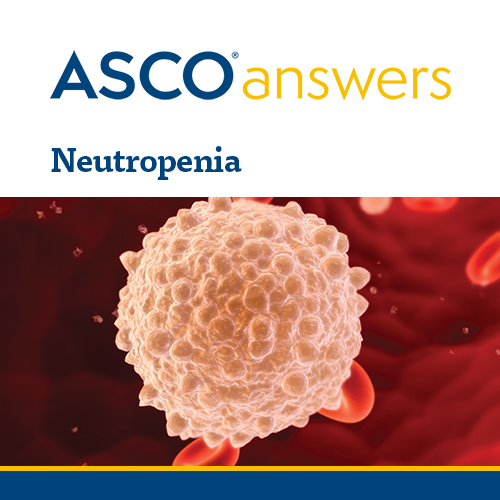How Long Does It Take for White and Red Blood Cells to Grow Again After Chemo
Neutropenia
Neutropenia is when a person has a depression level of neutrophils. Neutrophils are a type of white blood prison cell. All white claret cells help the body fight infection. Neutrophils fight infection by destroying harmful bacteria and fungi (yeast) that invade the body. Neutrophils are made in the os marrow. Os marrow is the spongy tissue found in larger basic such as the pelvis, vertebrae, and ribs.
One-half of people with cancer who are receiving chemotherapy have some level of neutropenia. It is a common side upshot in people with leukemia. People who have neutropenia have a higher risk of getting serious infections. This is because they do not take enough neutrophils to kill organisms that cause infection. People with severe or long-lasting neutropenia are most likely to develop an infection.
Signs and symptoms of neutropenia
Neutropenia itself may not cause whatever symptoms. People usually detect out they have neutropenia from a claret exam or when they go an infection. Some people will experience more tired when they have neutropenia. Your doctor will schedule regular blood tests to look for neutropenia and other claret-related side effects of chemotherapy.
For people with neutropenia, even a minor infection can apace become serious. Talk with your health care team correct away if you lot have whatever of these signs of infection:
-
A fever, which is a temperature of 100.five°F (38°C) or college
-
Chills or sweating
-
Sore throat, sores in the mouth, or a toothache
-
Intestinal pain
-
Pain near the anus
-
Hurting or burning when urinating, or urinating often
-
Diarrhea or sores around the anus
-
A cough or shortness of breath
-
Whatever redness, swelling, or pain (particularly around a cut, wound, or catheter)
-
Unusual vaginal belch or itching
Causes of neutropenia
Several things related to cancer and its handling tin cause a low level of neutrophils, including:
-
Some types of chemotherapy
-
Cancers that affect the bone marrow directly, such as leukemia, lymphoma, and multiple myeloma
-
Cancer that has spread
-
Radiation therapy to several parts of the body or to bones in the pelvis, legs, chest, or abdomen
Some people with cancer are more than likely to develop neutropenia, including:
-
People who are age 70 or older
-
People with a lowered immune system from other causes, such as having HIV or an organ transplant
Chemotherapy and neutrophils
The timing of the drop in neutrophil levels is based on the type or dose of chemotherapy.
-
Neutrophil counts more often than not start to driblet about a calendar week afterwards each circular of chemotherapy begins.
-
Neutrophil levels reach a low indicate about 7 to 14 days later on treatment. This is called the nadir. At this point, you are virtually likely to develop an infection.
-
Your neutrophil count then starts to rising once more. This is considering your bone marrow restarts normal product of neutrophils. But it may take 3 to iv weeks to attain a normal level over again.
-
When your neutrophil level returns to normal, you are set up for the adjacent round of chemotherapy.
Managing and treating neutropenia
An important part of cancer intendance is relieving the side effects of handling. This is called palliative care or supportive care. Talk with your health care squad about any symptoms you accept or whatsoever changes in symptoms.
While taking chemotherapy, sometimes your neutrophil level does not return to normal fast plenty. Or yous develop neutropenia. In this case, your doctor may accept certain precautions, including:
-
Delaying the next round or lower the dose of chemotherapy.
-
Recommending antibiotics during longer periods of neutropenia to prevent infections.
-
If you have neutropenia with a fever, your doctor may requite you medications called white blood cell growth factors. These drugs help the body make more than white blood cells. Read more than about ASCO'due south guideline on white blood cell growth factors.
If you take neutropenia, practice adept personal hygiene to lower your adventure of infection. This includes washing your hands regularly and staying away from people who are ill.
Related Resource
Side Effects of Radiations Therapy
Side Effects of Chemotherapy
More Information
National Cancer Establish: Infection and Neutropenia During Cancer Treatment
 Download ASCO'south complimentary Neutropenia fact sheet. This 1-folio printable PDF introduction to neutropenia includes possible causes, symptoms, how it is diagnosed, treatment options, words to know, and questions to inquire the healthcare squad. Order printed copies of this fact sheet from the ASCO Store.
Download ASCO'south complimentary Neutropenia fact sheet. This 1-folio printable PDF introduction to neutropenia includes possible causes, symptoms, how it is diagnosed, treatment options, words to know, and questions to inquire the healthcare squad. Order printed copies of this fact sheet from the ASCO Store.
Source: https://www.cancer.net/coping-with-cancer/physical-emotional-and-social-effects-cancer/managing-physical-side-effects/neutropenia
Belum ada Komentar untuk "How Long Does It Take for White and Red Blood Cells to Grow Again After Chemo"
Posting Komentar